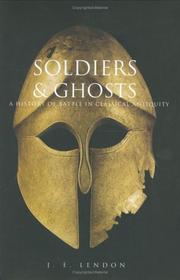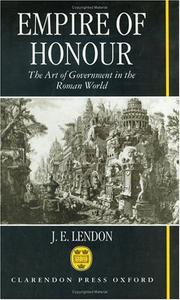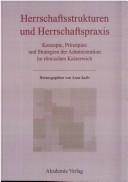| Listing 1 - 9 of 9 |
Sort by
|
Book
ISBN: 9789026321955 Year: 2011 Publisher: Amsterdam Ambo
Abstract | Keywords | Export | Availability | Bookmark
 Loading...
Loading...Choose an application
- Reference Manager
- EndNote
- RefWorks (Direct export to RefWorks)
Griekse oudheid --- History of ancient Greece --- Sparta --- Athens --- Peloponnesische oorlog --- Griekenland --- Hellas --- Geschiedenis --- 5e eeuw v. Chr. --- Geneeskunde --- Techniek (wetenschap) --- Atlas --- Museum

ISBN: 0300106637 9780300106633 9780300119794 0300119798 Year: 2005 Publisher: New Haven (Conn.) Yale university press
Abstract | Keywords | Export | Availability | Bookmark
 Loading...
Loading...Choose an application
- Reference Manager
- EndNote
- RefWorks (Direct export to RefWorks)
"Ranging from the Battle of Champions between Sparta and Argos in 550 BC through Julian's invasion of Persia in 363 AD, Soldiers and Ghosts brings to life the most decisive military contests of ancient Greece and Rome. J.E. Lendon places these battles, and the methods by which they were fought, in a sweeping narrative of ancient military history. On every battlefield, living soldiers fought alongside the ghosts of tradition - ghosts that would inspire greatness for almost a millennium before ultimately coming to stifle it."--Jacket.
Antieke krijgsgeschiedenis --- Histoire militaire de l'Antiquité --- Krijgsgeschiedenis [Antieke ] --- Krijgsgeschiedenis van de oudheid --- Military history [Ancient ] --- Military history, Ancient. --- Military art and science --- Histoire militaire ancienne. --- Art et science militaires --- Oorlogvoering. --- Klassieke oudheid. --- History. --- Histoire. --- Military history, Ancient --- Ancient military history --- Military history --- Naval history --- History

ISBN: 0198150792 Year: 1997 Publisher: Oxford Clarendon
Abstract | Keywords | Export | Availability | Bookmark
 Loading...
Loading...Choose an application
- Reference Manager
- EndNote
- RefWorks (Direct export to RefWorks)
Rome --- Politics and government --- Politique et gouvernement --- Empire, 30 B.C.-476 A.D.
Book
ISBN: 9780691221007 Year: 2022 Publisher: Princeton : Princeton University Press,
Abstract | Keywords | Export | Availability | Bookmark
 Loading...
Loading...Choose an application
- Reference Manager
- EndNote
- RefWorks (Direct export to RefWorks)
"When a group of Roman senators killed Julius Caesar, they shouted about death to tyrants. Two days later in the Senate, speeches were made recommending rewards for the tyrant-killers rather than punishments. These speeches were undoubtedly the result of the senators' elite education in rhetoric. During their boyhoods, they would have heard and been made to give speeches on the overwhelmingly common theme of whether those who had killed tyrants were owed a prize from the city. The script for tyrant-slaying that they would have learned hints at a common, yet surprisingly overlooked aspect of Roman civilization and history. The early education of those who would make great decisions in the Roman world consisted primarily of learning language. Everything they learned was in service to eloquence; their teachers taught nothing useful for business, unless it was the business of eloquence itself. Classics has for more than a century traced the influence of rhetorical education on works of literature, both poetry and prose. In this book, Ted Lendon asks why this education should have any less of an effect on the political decisions and actions of those who were educated this way? Lendon aims to show that this unexpected aspect of ancient life-upper class rhetorical education-decidedly impacted the way Rome was ruled and in turn shaped key aspects of the Roman Empire. By examining Roman declamations, i.e., surviving dramatic public speeches and their themes, Lendon investigates the influence of rhetorical training on decisions with great public consequences in the Roman world: the killing of Julius Caesar; the choice and design of public buildings and monuments; the nature of Roman law; and ultimately the administrative structure of the empire itself"--
Rhetoric, Ancient. --- Rhetoric --- Education --- Political aspects --- Study and teaching --- Rome --- Social conditions. --- Civilization --- Rhétorique ancienne. --- Education. --- Rome (Empire). --- Conditions sociales.
Book
ISBN: 9782847342611 2847342613 Year: 2009 Publisher: Paris : Tallandier,
Abstract | Keywords | Export | Availability | Bookmark
 Loading...
Loading...Choose an application
- Reference Manager
- EndNote
- RefWorks (Direct export to RefWorks)
Military history, Ancient --- Military art and science --- Histoire militaire ancienne --- Art et science militaires --- History --- Histoire
Book
ISBN: 9780465015061 Year: 2010 Publisher: New York Basic Books
Abstract | Keywords | Export | Availability | Bookmark
 Loading...
Loading...Choose an application
- Reference Manager
- EndNote
- RefWorks (Direct export to RefWorks)


ISBN: 9783050084770 9783050041490 Year: 2014 Publisher: Berlin Akademie Verlag
Abstract | Keywords | Export | Availability | Bookmark
 Loading...
Loading...Choose an application
- Reference Manager
- EndNote
- RefWorks (Direct export to RefWorks)
Book

ISBN: 9780292796881 Year: 2021 Publisher: Austin
Abstract | Keywords | Export | Availability | Bookmark
 Loading...
Loading...Choose an application
- Reference Manager
- EndNote
- RefWorks (Direct export to RefWorks)
Digital

ISBN: 9780292796881 Year: 2021 Publisher: Austin, Tex. University of Texas Press
Abstract | Keywords | Export | Availability | Bookmark
 Loading...
Loading...Choose an application
- Reference Manager
- EndNote
- RefWorks (Direct export to RefWorks)
| Listing 1 - 9 of 9 |
Sort by
|

 Search
Search Feedback
Feedback About UniCat
About UniCat  Help
Help News
News